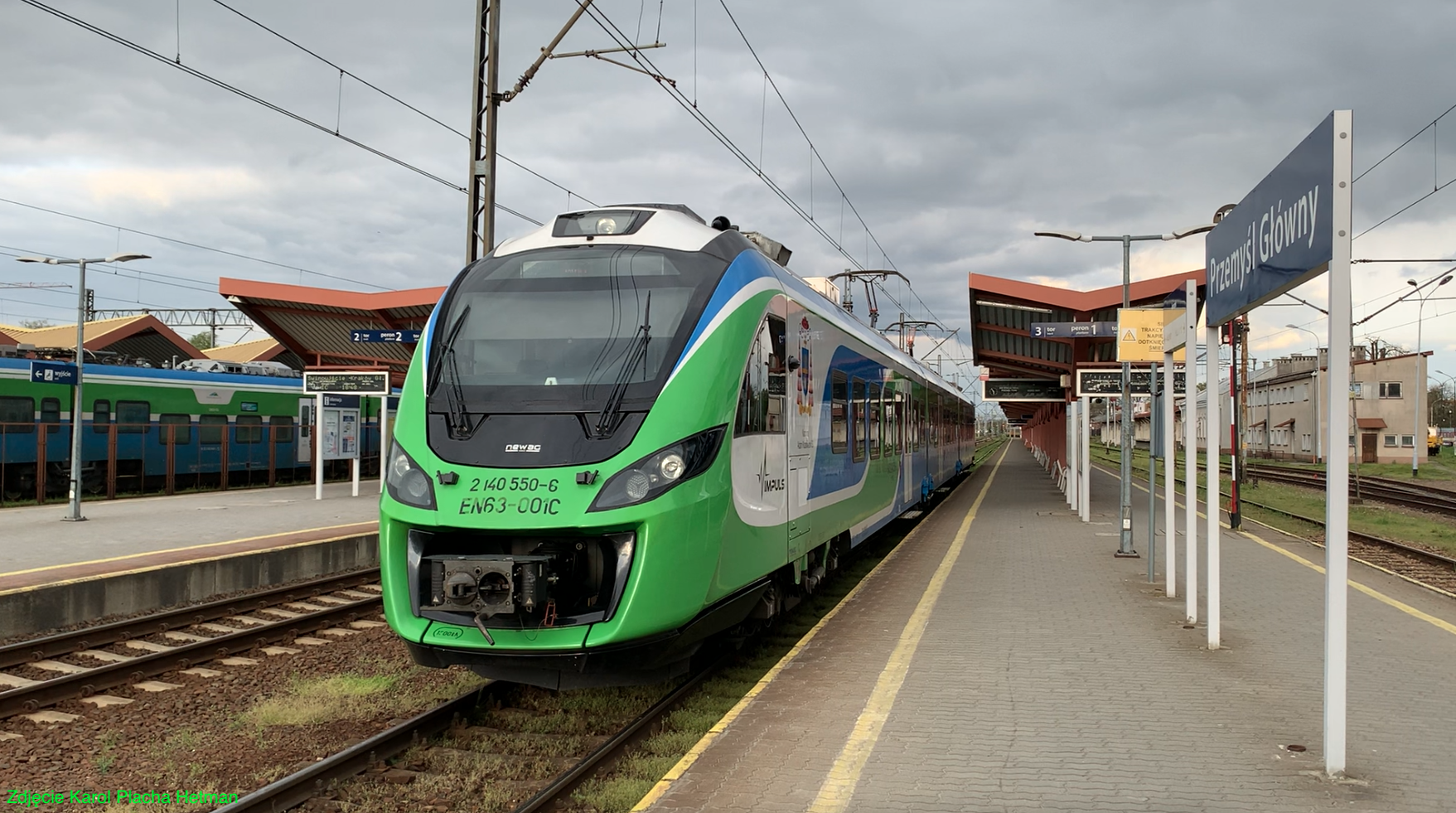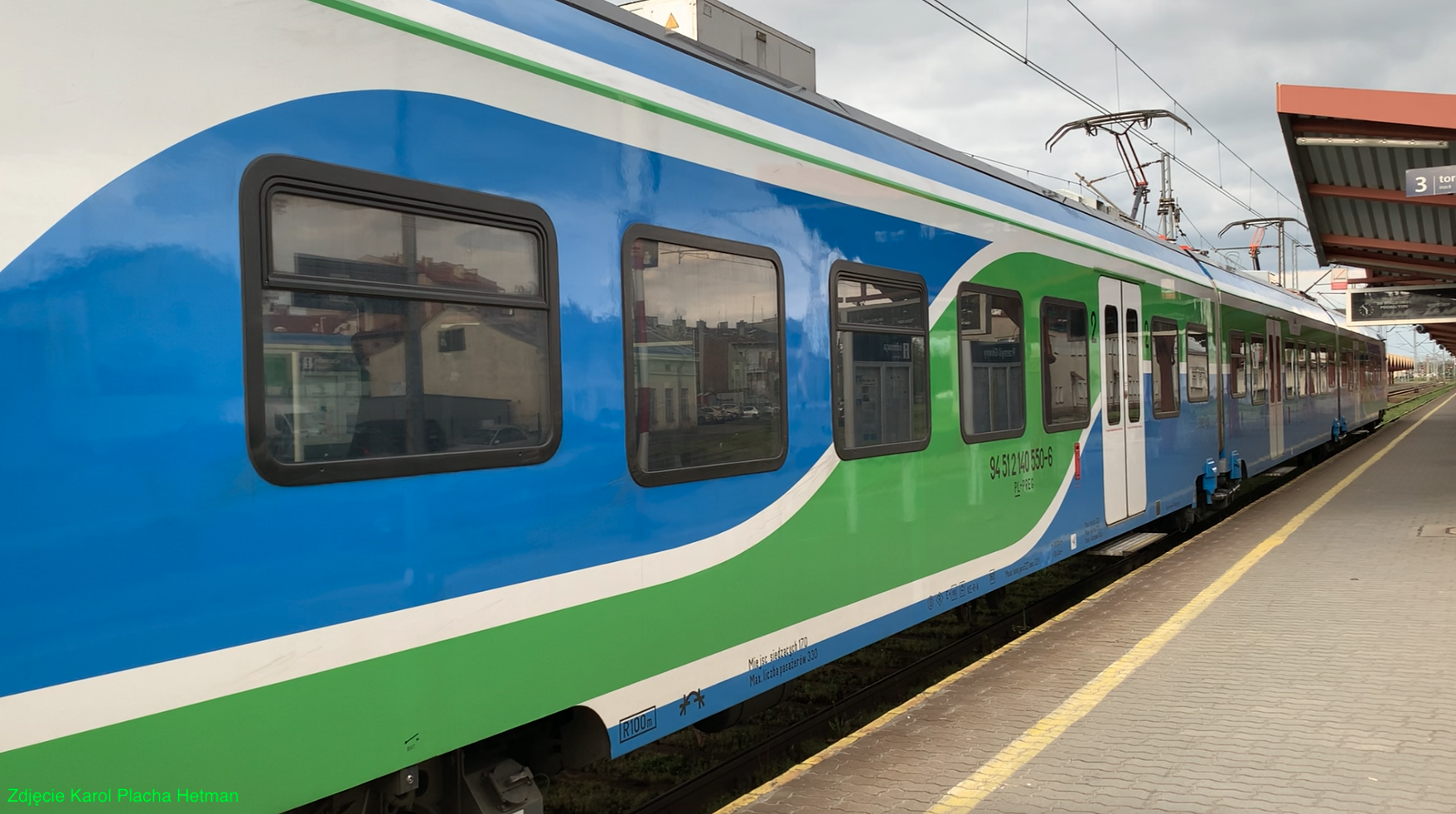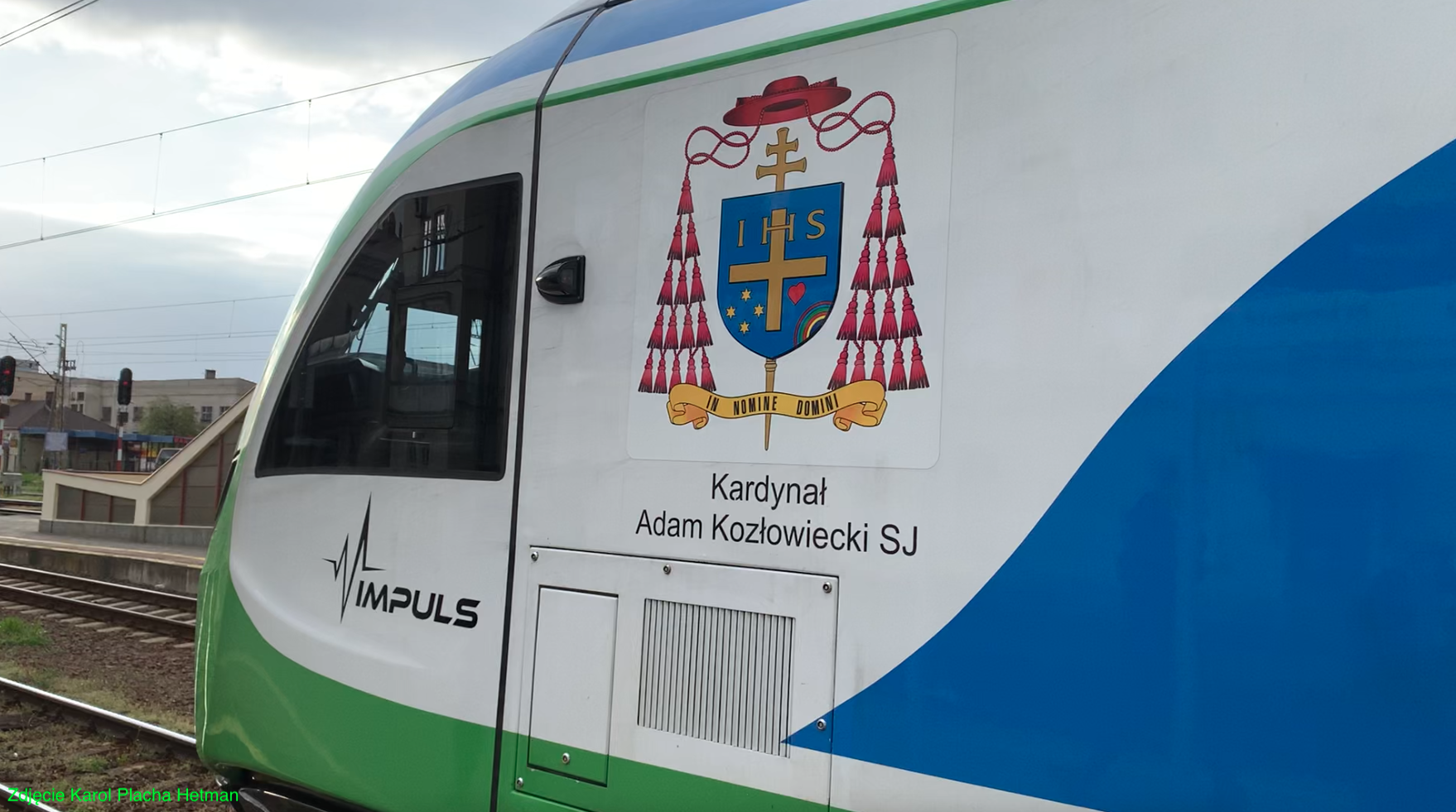Przemyśl 2023-05-04
Subcarpathian Railways.



Koleje Podkarpackie generally operates within the territory of the Podkarpackie Voivodship, whose capital is Rzeszów. Although the railway network in this part of Poland is not rich, it plays an important role. Especially the railway line Krakow - Tarnów - Rzeszów - Przemyśl - Lviv. There are 863 km of railway lines in operation in Podkarpacie. In 2018, 4.3 million passengers were transported, which meant an increase of 37% compared to 2015, i.e. nearly 1.2 million passengers. The most important carrier in the region is Przewozy Regionalne, or PolRegio. In the voivodeship, Koleje Małopolskie also provides transport services. The growing role of long-distance transport, especially to/from Ukraine, had a significant impact on the increase in the transport index.
Important changes took place in 2014, when PolRegio, together with the Podkarpackie Voivodeship, started to rebuild local connections.
From January 1, 2021, the Podkarpacka Kolej Agglomeration (PKA) operates on the sections Rzeszów - Przeworsk (line 91), Rzeszów - Dębica (line 91) and Rzeszów - Strzyżów n/W (line 106). Regional trains are operated by PolRegio. This merger meant that tickets issued by PolRegio and ZTM Rzeszów are honored on trains and buses, as part of the "Autobus + Pociąg" offer, both in zones I and II. A traveler with a valid single, monthly, quarterly, network or other ticket may travel both on a PKA train and on another PolRegio train. Tickets are available in the ticket sales system. polregio.pl and in the PolRegio mobile application, as well as at ticket offices and from the conductor.
The main assumption of PKA is a greater frequency of courses. The agglomeration railway is to connect with Rzeszów: Dębica, Przeworsk, Strzyżów and Kolbuszowa, as well as smaller towns on these routes. The voivodeship has set itself the goal that trains run every 30 minutes during peak hours, and every 60 minutes outside peak hours. It is expected that on each route, on working days, there should be at least 13 pairs of trains per day. This is to ensure the possibility of working in Rzeszów and living outside Rzeszów.
However, questions arose - Why do PKA end their run in Przeworsk, with a population of 15,000, and not in Jarosław, with a population of 40,000, located only 15 kilometers further to the east?
On line No. 106, the offer is limited for now, due to the lack of passing loops that will be built. Currently (2021) the electrification of line No. 71 Rzeszów - Kolbuszowa is underway. There are plans to build a railway siding and a railway stop at the Jasionka Airport. The amount of PLN 370 million was secured for these plans. Reconstruction of the Rzeszów-Staroniwa railway station is also planned. There are plans for a technological hall for inspections and repairs, with a car wash and a system of technological and parking tracks. Under this project, the own contribution of the Podkarpackie Voivodeship amounts to PLN 220 million.
New trains.
These plans required the purchase of new rolling stock. Initially, the purchase of 8 electric trains and 2 diesel trains was considered. The Podkarpacie Voivodeship expected the 3-unit units to have 150-170 seats and about 190 standing places. The 4-unit vehicles are to carry about 200 passengers seated and another 250 passengers standing.
A tender was organized for the purchase. The amount of PLN 337 million was secured. The tender was announced in February 2022. It was divided into two tenders. The first is the delivery of four brand new three-unit, two-drive traction units (so-called hybrids) powered from the 3 kV DC traction network and internal combustion engines. The second part concerns the delivery of eight new four-unit electric vehicles.
The demand for hybrid trains resulted from long-term plans in the province. Let us remember that such trains are already running in the Zachodniopomorskie and Dolnośląskie Voivodships. It was proposed to send hybrids, for example, to the Rzeszów - Horyniec Zdrój route. Trains will be sent on lines No. 101, 91 and 25. Hybrids will also go to Bieszczady on lines No. 106, 107 and 108.
In March 2022, only two companies entered the tender: Newag and Pesa. On March 23, 2022, bids were opened. In part number one, the only bidder was Newag, which offered PLN 152.44 million gross for 4 hybrid 3-car trains. Part two was the competition. Newag's offer amounts to PLN 263.22 million gross, and Pesa - PLN 287.491 million gross, for 8 4-car electric trains. On July 8, 2022, two contracts were signed with Newag for the purchase of 12 trains. The total value of the contracts is PLN 415 million gross.
Cardinal Adam Kozlowiecki.
Cardinal Adam Kozłowiecki, SJ, was born on April 1, 1911, in Huta Komorowska. He died on September 28, 2007 in Lusaka. He was a Polish Roman Catholic priest, Jesuit, missionary, Metropolitan Archbishop of Lusaka in the years 1959-1969, Cardinal Priest from 1998. Son of Adam and Maria née Janoch from the Kozłowiecki family of the Ostoja coat of arms. He was a pupil of the school in Chyrów, which was run by the Jesuits. Chynów is now within the borders of Ukraine. Then he was educated at the State Gymnasium of Saint Mary Magdalene in Poznań (1926–1929), where he passed the matriculation examination. On July 30, 1929, he joined the Jesuit Order (SJ), completed his novitiate in Stara Wieś near Brzozów, then studied at the Religious Faculty of Philosophy in Kraków (1931-1932) and at the Bobolanum Faculty of Theology in Lublin (1933-1937). He was ordained a priest by Bishop Karol Niemira on June 24, 1937, in Lublin, and took solemn religious vows on August 15, 1945 in Rome.
In the years 1933-1934 he worked as a youth tutor in the boarding school of the Saint Joseph's Educational Institution in Chyrów. On November 10, 1939, he was arrested by the Gestapo (a Germanic police for the liquidation of Poles). Initially, he was imprisoned in Kraków, and then in Nowy Wiśnicz near Bochnia. In June 1940 he was sent to the German concentration camp Auschwitz (prisoner number 1006), and in December 1940 he was transported to the Dachau camp (prisoner number 22187), where he lived to see the liberation of KL Dachau by the American Army on April 29, 1945.
After a short stay in Rome, he left at his own request for a Jesuit mission to Northern Rhodesia (later Zambia). He organized a religious house and Catholic education in the Kasisi region. From 1950, he served as apostolic administrator of the apostolic vicariate of Lusaka.
On June 4, 1955, Pope Pius XII made him titular bishop of Diospolis Inferior and apostolic vicar of Lusaka. He was ordained bishop on September 11, 1955. In April 1959, he was promoted to the first Metropolitan Archbishop of Lusaka. In 1966, he was elected the first president of the Zambian Episcopal Conference. He took part in the sessions of the Second Vatican Council, as well as in the sessions of the World Synod of Bishops in the Vatican.
On May 29, 1969, at his own request, he was relieved of his duties as Archbishop of Lusaka. In this way, he enabled the nomination of the Zambian priest Emmanuel Milingo, while receiving the titular see of Potentia in Piceno. He returned to missionary work, was a parish priest and vicar in the parishes of Zambia (Chingombe, Mumbwa, Chikuni, Chilalantambo, Lusaka, Mulungushi, Mpunde). He also served as president of the Pontifical Mission Societies in Zambia (1970–1991).
In February 1998, John Paul II elevated him to the dignity of a cardinal, giving him the title of presbyter of the Church of Saint Andrew in the Quirinal. At the time of his nomination as a cardinal, he was 87 years old, so he never had the right to participate in the conclave.
He died on September 28, 2007, in a hospital in Lusaka. On October 4, 2007, his body was placed on display at the Archcathedral of Lusaka, where the Holy Requiem Mass was presided over by the superior of the Province of the Society of Jesus there. The funeral ceremony took place on October 5, 2007, in the capital of Zambia at Pope's Square. The late cardinal was buried at the new Infant Jesus Cathedral in Lusaka.
Cardinal Adam Kozłowiecki was the author of many publications and was awarded many times for his religious and social activities. Among other things, by the decision of the President of the Republic of Poland Lech Kaczyński of May 24, 2007, "For outstanding merits in missionary work, for activities for people in need of help, for a patriotic attitude that spreads the name of Poland in the world", he was awarded the Grand Cross of the Order of Polonia Restituta. He also received the title and honorary badge "Meritorious for the Podkarpackie Voivodeship". Mementos of the cardinal are stored in the collections of the Museum of the Society of Jesus of the Province of Southern Poland in Stara Wieś near Brzozów.
In Poland, the memory of Cardinal Adam Kozłowiecki SJ has recently been commemorated in a dignified way. The first of the modern trainsets purchased by the Podkarpackie Voivodeship Self-Government received the coat of arms and the name of Cardinal Adam. The Newag EN63-001 EMU train with the coat of arms of Cardinal Adam Kozłowiecki has 170 seats for passengers. It has been equipped with air conditioning and a monitoring system, has facilities for the disabled, ticket vending machines, and access to the Internet thanks to the Wi-Fi network. Since December 2013, the train runs on the Rzeszów - Przemyśl - Rzeszów route.
Written by Karol Placha Hetman
